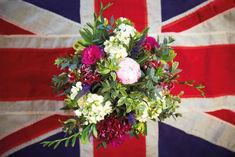
Where the fashion industry leads, the consumer often follows and right now the designer world is busy reviving interest in British flowers.
No longer seen as a pretty extra, flowers have become integral to catwalk shows with John Rocha creating an English garden for his models to sashay through for his show at this year’s London Fashion Week.
Demand for British flowers is on the rise at London’s Covent Garden Flower Market and recently a key member of the British Flower Growers association recently launched a retail website that specialises in funky, British grown bouquets.
The Great British Florist site is the brainchild of Heather Gorringe, supplier of British flowers and gardening supplies through her business Wiggly Wigglers. “One of my clients is Jigsaw [women’s high-end fashion store chain] and it is committed to British flowers,” says Gorringe.“Jigsaw want funky, fashion-forward displays and we can provide that using British flowers.”
Gorringe says that while 20 years ago there were only a certain number of varieties that could be grown commercially in the UK, today with the development of technology that is no longer the case.“There are a wide variety of flowers available in this country,” added Gorringe
“British flowers can be cut and within 24 hours be in the hands of a customer, while it takes around three days for flowers from places such as Kenya to reach their destination.” Gorringe would like to see a nationwide marketing campaign for British flowers along the same lines, but not in the same style, as that of the Dutch flower industry’s recent Funny How Flowers Do That.
Organised by The Flower Council, the marketing arm of the Dutch floricultural sector, the £500,000 campaign has been running on billboards and online to promote the purchasing of flowers.
Covent Garden Flower Market wholesalers say they would also welcome a campaign to drive sales of more British flowers, which would then help to boost business for UK growers.
There are certainly lots of patriotic decorations festooning the market, with the Jubilee spirit still in full swing. There is no doubting the wholesaler Pratley’s dedication to British products, with a portrait of Her Majesty watching over the boxes and boxes of UK grown flowers.
Owner Mick Waite buys his blooms from growers in Devon, Lincolnshire and the Isles of Scilly to name but a few of the areas he sources from.“Florists love British flowers, there is always a high demand for them,” he says. “The public love them, especially on the back of the Jubilee and the Olympics, and we should capitalise on that. People want to buy British and so the more we can encourage British growers, the better.”
David Donovan, partner in wholesaler John Austin, says that increasingly his customers are asking for British flowers and although it has become a niche market, he can see the scope for a revival.“What we need are more growers and more investment in the sector,” he says. “It used to be that the Dutch product was cheaper, but increasingly it’s not as competitive as it used to be. There is an opportunity for the British growers to get back into the market.”
The British floriculture industry was given a high profile promotion through the victory bouquets handed out to Olympic and Paralympics winners this summer. Designed by the florist Jane Packer, the brief given to the company was that all the components were British grown.
“Although not indigenous, in our mind the most British flower is the rose, it’s our national flower too,” explained a spokesman. “Sadly, although we possess the expertise, no UK grower was currently producing roses for commercial use, so we have commissioned the growing of the roses in the design to specifically for London 2012.”
The good news is that this has demonstrated that flowers can be grown in Britain to order, Jane Packer needed 60,000 roses and these were delivered in time for assembling the Olympic bouquets.
Heather Gorringe is optimistic about the future of the industry, likening the packaging and selling of British flowers to the way the high-end chocolate stores Hotel Chocolat market its products. “It used to be that limited availability meant inconvenience but now, to many, it means exclusivity and that’s what customers want,” she says.
“The British flower is a premium product, and should be marketed that way. There will always be the people that pick up a bunch of flowers from the supermarket, but then there is also a market for when they really want to treat themselves or others.
“Not only do we have a great product, but also we have all the green credentials with the reduction in air miles. There has been a real movement and support for British products, and this is the time to make people aware of what it means to buy British flowers.”